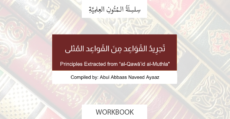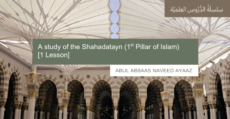In the name of Allāh, ar-Raḥmān (the most merciful), ar-Raḥīm (the bestower of mercy).
All praise is for Allāh, who is glorified above what people attribute to him, the most high, the oft-forgiving. May Allāh send salutations of praise and peace upon his noble Prophet, who taught us about our Lord, and his family and Ṣaḥābah who followed his teachings without deviation.
Thereafter,
There are several āyāt in the Qur’an that speak about al-ma’iyyah, i.e., the “closeness,” “divine togetherness,” or “divine accompaniment” of Allāh to His creation. Unfortunately, these āyāt have been misunderstood, with sects incorrectly thinking that they necessitate Allāh is in every place, in every sense, at all times, together with his creation in dhāt (divine essence) – glorified is our Lord above what they say.
This belief, of Allāh being everywhere, opposes the belief of the imāms of the Salaf (early pious generations). It is the ijmā’ (unanimous agreement) of those who were more virtuous than them – the Ṣaḥābah and Tābi’īn.
With the permission of Allāh, this article aims to clarify doubts regarding this issue, shed light on āyāt that are misunderstood by some sects, and establish the belief of the Salaf.
Misunderstood āyāt.
The āyāt which some of the deviated sects use to justify their belief that Allāh is in every place in every sense includes:
{وَنَحْنُ أَقْرَبُ إِلَيْهِ مِنْ حَبْلِ الْوَرِيدِ} ق: ١٦
{…and We are closer to him than [his] jugular vein} [50:16]
{وَهُوَ الَّذِي فِي السَّمَاءِ إِلَٰهٌ وَفِي الْأَرْضِ إِلَٰهٌ} الزخرف: ٨٤
{It is Allāh who is [the only] deity in the heaven, and on the earth [the only] deity} [43:84]
{وَهُوَ مَعَكُمْ أَيْنَ مَا كُنتُمْ} الحديد:٤
{He is with you wherever you are…} [57:04]
{قَالَ لَا تَخَافَا إِنَّنِي مَعَكُمَا} طه: ٤٦
{He said: Fear not, surely I am with you both (Mūsa and Hārūn(} [20:46]
{هُوَ مَعَهُمْ أَيْنَ مَا كَانُوا} المجادلة: ٧
{…he is with them wheresoever they may be} [58:07]
If a person reads these noble āyāt, disregarding their context, as well as ignoring many other āyāt which affirm where Allāh is, he would wrongfully assume that Allāh is indeed in every place in every sense.
Ignoring the context
The first reason for this misunderstanding is ignoring the context of such āyāt. If a person reads the āyāt in their full context, they will see that the “closeness” or “divine togetherness” of Allāh is in his attributes of knowledge, seeing, hearing, etc. and does not relate to his divine essence.
Importantly, words, sentences and speech – Arabic or otherwise – can only be accurately understood by knowing their context. I will mention below the āyāt in full, so the context becomes clear to the reader,
{وَلَقَدْ خَلَقْنَا الْإِنسَانَ وَنَعْلَمُ مَا تُوَسْوِسُ بِهِ نَفْسُهُ ۖ وَنَحْنُ أَقْرَبُ إِلَيْهِ مِنْ حَبْلِ الْوَرِيدِ} ق: ١٦
{Indeed we created man and know what his soul whispers to him, and we are closer to him than [his] jugular vein} [50:16]
{وَهُوَ الَّذِي فِي السَّمَاءِ إِلَٰهٌ وَفِي الْأَرْضِ إِلَٰهٌ ۚ وَهُوَ الْحَكِيمُ الْعَلِيمُ} الزخرف: ٨٤
{It is Allāh who is [the only] deity in the heaven, and on the earth [the only] deity. He is the all-wise, the all-knowing} [43:84]
{هُوَ الَّذِي خَلَقَ السَّمَاوَاتِ وَالْأَرْضَ فِي سِتَّةِ أَيَّامٍ ثُمَّ اسْتَوَىٰ عَلَى الْعَرْشِ ۚ يَعْلَمُ مَا يَلِجُ فِي الْأَرْضِ وَمَا يَخْرُجُ مِنْهَا وَمَا يَنزِلُ مِنَ السَّمَاءِ وَمَا يَعْرُجُ فِيهَا ۖ وَهُوَ مَعَكُمْ أَيْنَ مَا كُنتُمْ ۚ وَاللَّهُ بِمَا تَعْمَلُونَ بَصِيرٌ} الحديد:٤
{It is he who created the heavens and earth in six days and then established Himself above the ‘arsh (throne). He knows what penetrates into the earth and what emerges from it and what descends from the heaven and what ascends therein; and he is with you wherever you are. And Allāh is all-seeing of what you do} [57:04]
{قَالَ لَا تَخَافَا إِنَّنِي مَعَكُمَا أَسْمَعُ وَأَرَىٰ} طه: ٤٦
{He said: Fear not, surely I am with you both (Mūsa and Harūn): I hear and see} [20:46]
{أَلَمْ تَرَ أَنَّ اللَّهَ يَعْلَمُ مَا فِي السَّمَاوَاتِ وَمَا فِي الْأَرْضِ ۖ مَا يَكُونُ مِن نَّجْوَىٰ ثَلَاثَةٍ إِلَّا هُوَ رَابِعُهُمْ وَلَا خَمْسَةٍ إِلَّا هُوَ سَادِسُهُمْ وَلَا أَدْنَىٰ مِن ذَٰلِكَ وَلَا أَكْثَرَ إِلَّا هُوَ مَعَهُمْ أَيْنَ مَا كَانُوا ۖ ثُمَّ يُنَبِّئُهُم بِمَا عَمِلُوا يَوْمَ الْقِيَامَةِ ۚ إِنَّ اللَّهَ بِكُلِّ شَيْءٍ عَلِيمٌ } المجادلة: ٧
{Have you not seen that Allāh knows whatsoever is in the heavens and whatsoever is on the earth? There is no secret counsel of three but he is their fourth, nor of five but he is their sixth, nor less than that or more but he is with them wheresoever they may be} [58:07]
As you can see from the above āyāt, the context of Allāh being “with” and “close” to creation is in his attributes of rubūbiyyah (seeing, knowing, hearing etc.…) and not in his dhāt (divine essence). [1]
Ignoring the āyāt which affirm Allāh is above the heavens
In addition to the above, Allāh, the most-high, clearly mentions himself being above the heavens and above the ‘arsh (throne). He said,
{إِنَّ رَبَّكُمُ اللَّهُ الَّذِي خَلَقَ السَّمَاوَاتِ وَالْأَرْضَ فِي سِتَّةِ أَيَّامٍ ثُمَّ اسْتَوَىٰ عَلَى الْعَرْشِ} يونس: ٣
{Surely, your Lord is Allāh, who created the heavens and the earth in six days and then ascended above the throne} [10:03]
{إِلَيْهِ يَصْعَدُ ٱلْكَلِمُ ٱلطَّيِّبُ وَٱلْعَمَلُ ٱلصَّـٰلِحُ يَرْفَعُهُ} فاطر: ١٠
{To him ascend the goodly words, and the righteous deeds exalt it (i.e. the goodly words are not accepted by Allāh unless they are followed by good deeds)} [35:10]
{ٱلرَّحْمَـٰنُ عَلَى ٱلْعَرْشِ ٱسْتَوَىٰ} طه: ٥
{Ar-Raḥmān (the most merciful) rose above the ‘arsh (throne)} [20: 05]
{يَخَافُونَ رَبَّهُم مِّن فَوْقِهِمْ وَيَفْعَلُونَ مَا يُؤْمَرُونَ} النحل: ٥٠
{They fear their Lord above them and they do what they are commanded} [16: 50]
{أَأَمِنتُم مَّن فِي ٱلسَّمَآءِ أَن يَخْسِفَ بِكُمُ ٱلْأَرْضَ فَإِذَا هِيَ تَمُورُ} الملك: ١٦
{Do you feel secure that He, Who is above the heaven, will not cause the earth to sink with you, and then it should quake?} [67:16]
The Prophet ﷺ said:
[O Allāh], you are the most-high and there is nothing above You… [2]
Also, in the farewell sermon, the Prophet ﷺ asked the Ṣaḥābah:
You will be asked about me [on the Day of Resurrection], so what will you say?
The Ṣaḥābah said: “We will bear witness that you have conveyed [the message], fulfilled [the trust] and sincerely advised.”
The narrator said:
The Prophet ﷺ then raised his forefinger towards the Heavens, and then pointed at the people (saying): “O Allāh, be a witness. O Allāh, be a witness” – saying it thrice. [3]
There are many other proofs for Allāh being above the Heavens and not everywhere; in fact “the Book of Allāh, from its beginning to its end, and the sunnah of his Messenger ﷺ, from its beginning to its end, and likewise the speech of the Ṣaḥābah and the Tabi‘īn by far and larhe, and then the speech of all the other imāms – all of it is filled with proofs which are either explicit or apparent in affirming that Allāh, glorified and exalted, is al-‘Aliyy (most-high), al-A’lā (the highest); that he is above everything, over everything, and that he is above the ‘arsh (throne) and the heavens.” [4]
The consensus of the Salaf is that Allāh is above his creation.
In addition to the many proofs of the Qur’ān and sunnah which affirm Allāh is above the heavens, the early generation of pious Muslims unanimously agreed to this belief. This ijmā’ (unanimous agreement) has been conveyed by the imāms of this religion, from the earliest times. Below is a selection of some of their statements:
Al-Awzā’ī [d:157h]: “We, and the Tābi’ūn unanimously say: ‘verily, Allāh, the exalted, has mentioned that he is above his ‘arsh, and we believe in what is narrated in the Sunnah regarding his attributes…” [5]
Qutaybah ibn Sa’īd [d: 240h]: “This is the view of the scholars in Islām, Ahlus-Sunnah wal-Jamā’ah, they confirm that our Lord is above the seventh heaven, above his throne, just as he said: {ar-Raḥmān (the most-merciful) ascended above the throne}” [6]
Ibn Abī Ḥātim [d: 327h]: “I asked my father and Abu Zur’ah ar-Rāzī regarding the belief of Ahlus-Sunnah regarding the foundations of the religion, and what the scholars of the various lands whom they both met believed in. They both replied: “We met the scholars of the various lands, Ḥijāz, ‘Irāq, Shām and Yemen, their belief was…. that Allāh, the exalted and majestic, is above his throne, separate from his creation, as he has described himself in his Book and upon the tongue of his messenger ﷺ, [we affirm this] without describing the reality, and his knowledge is in every place…” [7]
Ibn Qudāmah al-Maqdisī [d:620h]: “Allāh, the most-high, described himself with ‘Uluww (highness and ascendancy), and the seal of the Prophets, Muḥammad ﷺ, also described him with this attribute. The scholars, amongst the pious Ṣaḥābah, and the scholars of Fiqh, unanimously agreed upon this.
The narrations regarding this are mutawātir [8] and, therefore, conclusive. Allāh has united the hearts of the Muslims upon this, and it is intrinsic to human nature. For this reason, you see [people], when a calamity afflicts them, they look up towards the sky with their eyes, and they raise their hands [upwards] for du’ā, waiting for relief to come from their Lord. They utter this upon their tongue (i.e. supplicating to Allāh, knowing he is above them). Nobody denies this except an innovator, extreme in his bid’ah (innovation), or one afflicted by blindly following an innovator upon his misguidance.” [9]
Adh-Dhahabi [d: 748h] said, “Allāh is above his throne as the first generation (i.e. the Ṣaḥābah and those after them) agreed upon, as conveyed by the imāms.” [10]
He also said: “The proof that Allāh, the most-high, is above his throne, above his creation, separate from them, not within anything from his creation; and the proof that his knowledge is in every place is in: the Book, Sunnah, and ijmā’ of the Ṣaḥābah, Tābi’īn and the guided imāms.” [11]
What Allāh being in every place necessitates
A person must consider the evil and lowly conclusions that can be drawn from the belief that the divine essence of Allāh is in every place at all times. There are places upon this earth of impurity and dirt that would be befitting for our Lord, most exalted and majestic, such as graveyards, toilets, barns, places of filth – glorified is Allāh and pure.
The scholarly principle in this regard is: “Any statement which leads to a conclusion of unequivocal falsehood must itself be false.” [12]
Conclusion
If a person asks, how, therefore, can we reconcile between the various textual proofs affirming that Allāh is above the heavens, as well as the proofs that Allāh is close to us, the answer can be given considering the very context of the āyāt and ḥadīth, that: “Allāh is above the heavens, distinct from creation, and he is everywhere in his attributes of Rubūbiyyah such as Knowledge, ability, help, hearing and sight.”
The Ṣaḥābah and imāms of knowledge have affirmed this meaning.
‘Abdullāh ibn Mas’ūd, raḍiaAllāhu ‘anhu said, “The throne is above the water, and Allāh is above the throne, and none of your actions are hidden from Him.” [13]
He also said, “The throne is above the water, and Allāh is above the throne, and he knows what you do.”
It is narrated from Imām Mālik [179h] that he said: “Allah is above the heavens, and his knowledge is in every place, no place escapes [His knowledge]”. [14]
‘Abdullah, the son of Imām Aḥmad ibn Ḥanbal [241h], said: “I asked my father, ‘Allah is above the seventh heaven, above his throne, separate from his creation, and his ability and his knowledge are in every place?”
He (i.e. Imām Aḥmad) replied: “Yes, above the throne, and no place is void of his knowledge”
Abu ‘Īsa at-Tirmidhī [d: 279] said: “The knowledge of Allāh, his ability and authority are in every place, and he is above the throne as he described himself in his Book.” [15]
Ibn Abī Zayd al-Qayrawāni [died: 386h] said: “From the religious matters that the Ummah has unanimously agreed upon…is that He (Allāh) is above the heavens, upon his throne, not in the earth, and he is in every place with his knowledge.” [16]
I ask Allah, the most high, who is above his throne, that he guides us to what is correct, and guides us to following the Sunnah of his Prophet ﷺ in beliefs, statements and actions.
May peace and blessings be upon his Prophet, and his wives, Ṣaḥābah and those who followed his guidance.
Written by the one in need of Allāh,
Abul Abbaas Naveed Ayaaz
Nelson, Lancashire.
11th Safar, 1437h
Corresponding to 24th November, 2015.
Footnotes
[1] If a person says that the addition ‘in his dhāt’ is an innovated term, and the Prophet ﷺ did not mention it, the reply is that we only mention these words in reply to the deviated belief that Allāh is everywhere in his dhāt. Otherwise, we would not need to say this; we would suffice with the statement of the early scholars: “Allāh is above his throne, and his knowledge is everywhere”.
In addition to this, the word “dhāt” has been used by some scholars when affirming Allāh is above his creation, such as Ibn Abil ‘Izz al-Ḥanafi, who said: “…and from his attributes, may he be glorified, is that he is al-‘Aliyy (the Most High), with all types of ‘Uluww – elevated in his qadr (status), ‘Uluww in his qahr (subjugation) and ‘Uluww in his dhāt.” [Refer to: Sarḥ al-‘Aqīdah at-Ṭaḥāwiyyah by Ibn Abil ‘Izz al-Ḥanafi]
[2] Narrated by Abu Hurayrah; Collected by Muslim.
[3] Narrated by several Ṣaḥābah with different wordings; Collected by al-Bukhārī, Muslim & others.
[4] Ibn Taymiyyah in “al-Fatwa al-Ḥamawiyyah”.
[5] Narrated by al-Bayhaqī in “al-Asmā was-Ṣifāt amongst other others.
[6] Narrated by Adh-Dhahabi, in Al-‘Uluww lil ‘Aliyy Al-Ghaffaar
[7] Narrated by al-Lālikāī in “Sharḥ Usūl I’itqād Ahlis Sunnah”; the treatise of Abu Ḥātim is published independently as: “’Aqīdah ar-Rāziyayn”.
[8] Mutawātir, i.e., transmitted narrations such that there is no doubt regarding their authenticity.
[9] Ibn Qudāmah al-Maqdisī in “Ithbāt Ṣiffat al-‘Uluww”.
[10] In the conclusion of his book: “al-‘Uluww lil ‘Aliyy al-Ghaffār.”
[11] Adh-Dhahabi in “Kitāb al-‘Arsh”.
[12] Ibn Taymiyyah in “Dar Ta’aruḍ al-‘Aql wan-Naql.”
[13] Collected by ad-Dārimī in “ar-Radd ‘Alā al-Jahmiyyah”.
[14] Narrated by adh-Dhahabī in “al-‘Uluww lil ‘Aliyy al-Ghaffār”
[15] At-Tirmidhī in al-Jāmi’ al-Kabīr(Sunnan at-Tirmidhī).
[16] Ibn Abī Zayd al-Qayrawāni in “ar-Risālah”, in the Chapter: “What the Tongues must Profess and the Hearts must Believe from the Obligatory Matters of the Religion”.






